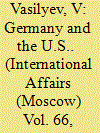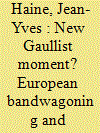| Srl | Item |
| 1 |
ID:
070457


|
|
|
| 2 |
ID:
173291


|
|
|
|
|
| Summary/Abstract |
DONALD TRUMP'S TENURE as U.S. president has shaken the Germans' trust in the United States as guarantor of their security and well-being. They are going through a painful and complicated process of trying to comprehend the United States' policy of economic protectionism, its diplomacy of sanctions, and its demands that European nations raise their contributions to NATO's budget to 2% of their gross domestic product (GDP).
|
|
|
|
|
|
|
|
|
|
|
|
|
|
|
|
| 3 |
ID:
141280


|
|
|
|
|
| Summary/Abstract |
The transatlantic partnership needs to be reassessed. Since the end of the Cold War, Europe has chosen to bandwagon with the United States and to outsource its security to Washington. Bandwagoning has serious consequences when the use of force is at stake: it may lead to entrapment, where weaker allies may be involuntarily dragged into a conflict. It may also lead to abandonment, where the dominant ally may choose to discard their vital security concerns. With the evolution of the international system towards a multipolar configuration, this strategy of bandwagoning is becoming increasingly costly for Europe while the dominant power, the United States, is progressively confronted by other competitors at the systemic level. These classic dilemmas attached to an asymmetric partnership are exacerbated in a multipolar configuration. In particular, the abandonment scenario may become more and more frequent precisely because there is competition—and thus potential costs—at the international level: the United States may leave Europe alone, not by choice but by necessity. The current crisis in Ukraine illustrates this shift: while some American leaders were keen to escalate the conflict by arming Ukraine, the Obama administration's commitment to the defence of Europe has been minimal and it has largely delegated the management of the crisis to the Europeans themselves. Washington had other and more important priorities. Strategic autonomy is not an option for Europe; it has become a reality, a Gaullist moment where Europeans will have to learn to think and act strategically for themselves.
|
|
|
|
|
|
|
|
|
|
|
|
|
|
|
|
| 4 |
ID:
086501


|
|
|
|
|
| Publication |
2009.
|
| Summary/Abstract |
The Obama administration has to rethink the transatlantic partnership in light of shifting power relations and new global security threats. Washington's preferred Atlantic institution, NATO, is already overburdened. The European Union should be prepared to step in and contribute according to its strengths.
|
|
|
|
|
|
|
|
|
|
|
|
|
|
|
|
| 5 |
ID:
184475


|
|
|
|
|
| Summary/Abstract |
This article focuses on Metropolitan State University Denver Debate’s participation in the 2020 Schuman Challenge, a competition hosted by the Delegation of the European Union to the United States. Undergraduate participants were asked to answer the question: “How should the EU and the U.S. respond to China’s alternative models of governance?” In response, the debate team focused on the People’s Republic of China’s human rights violations against the Uyghurs. Three recommendations to address this injustice were presented: (1) expand the use of the Magnitsky Act; (2) amplify current EU/U.S. sanctions; and (3) apply pressure on China’s efforts to secure natural resources. Overall, the debate team’s research suggested that these approaches would both strengthen the EU/U.S. partnership and promote a coordinated response to China aimed at pursuing justice for the Uyghur people. This article also highlights the authors’ journey to engage in advanced undergraduate research focused on foreign policy.
|
|
|
|
|
|
|
|
|
|
|
|
|
|
|
|